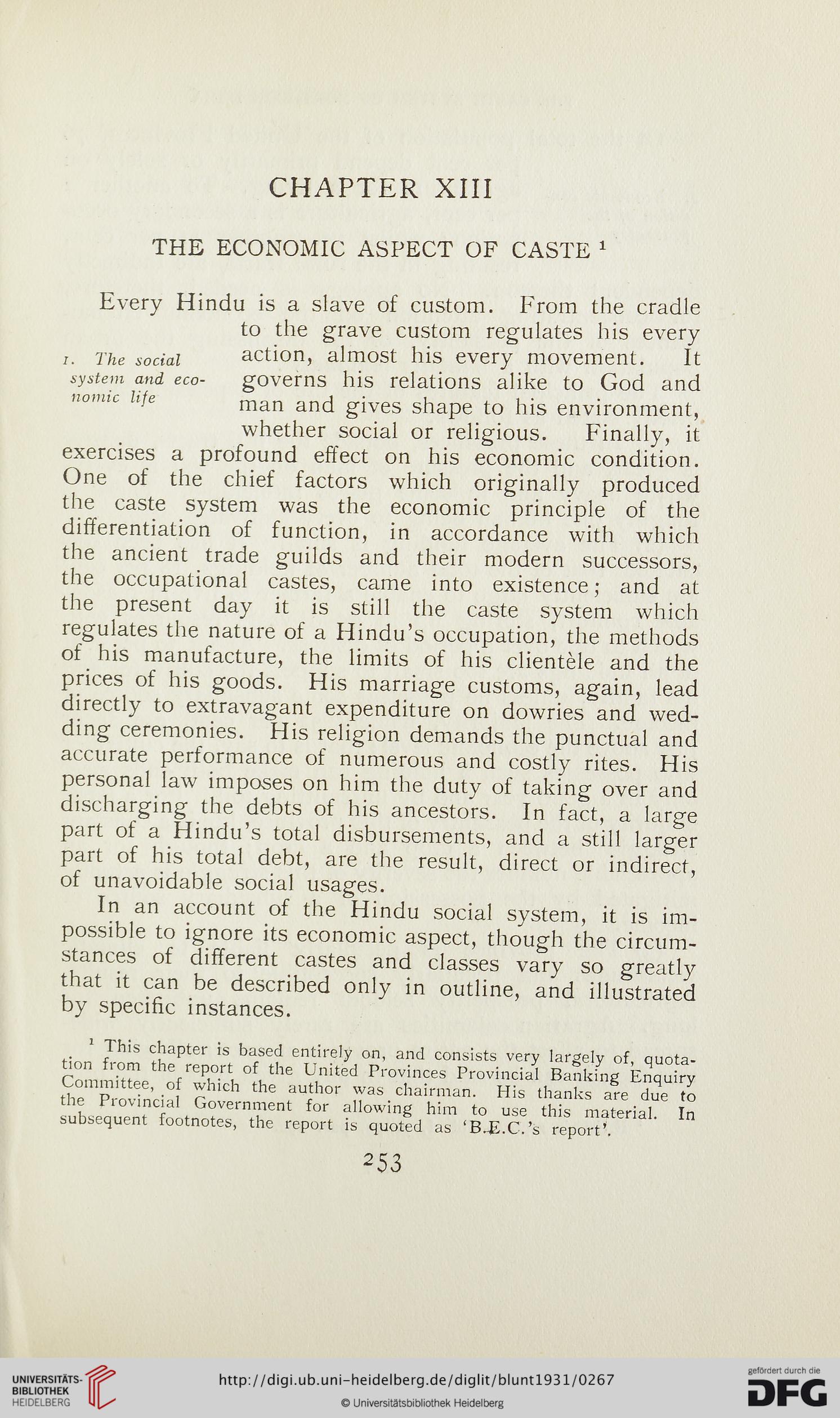CHAPTER XIII
THE ECONOMIC ASPECT OF CASTE 1
Every Hindu is a slave of custom. From the cradle
to the grave custom regulates his every
/. The sociai action, almost his every movement. It
system and eco- governs his relations alike to God and
novuc hfe man and gives shape to his environment,
whether social or religious. Finally, it
exercises a profound effect on his economic condition.
One of the chief factors which originally produced
the caste system was the economic principle of the
differentiation of function, in accordance with which
the ancient trade guilds and their modern successors,
the occupational castes, came into existence; and at
the present day it is still the caste system which
regulates the nature of a Hindu’s occupation, the methods
of his manufacture, the limits of his clientele and the
prices of his goods. His marriage customs, again, lead
directly to extravagant expenditure on dowries and wed-
ding ceremonies. His religion demands the punctual and
accurate performance of numerous and costly rites. His
personal law imposes on him the duty of taking over and
discharging the debts of his ancestors. In fact, a large
part of a Hindu’s total disbursements, and a still larger
part of his total debt, are the result, direct or indirect,
of unavoidable social usages.
In an account of the Hindu social system, it is im-
possible to ignore its economic aspect, though the circum-
stances of different castes and classes vary so greatly
that it can be described only in outline, and illustrated
by specific instances.
1 This chapter is based entirely on, and consists very largely of, quota-
tion from the report of the United Provinces Provincial Banking Enquiry
Committee, of which the author was chairman. His thanks are due to
the Provincial Government for allowing him to use this material. In
subsequent footnotes, the report is quoted as ‘B.E.C.’s report*.
253
THE ECONOMIC ASPECT OF CASTE 1
Every Hindu is a slave of custom. From the cradle
to the grave custom regulates his every
/. The sociai action, almost his every movement. It
system and eco- governs his relations alike to God and
novuc hfe man and gives shape to his environment,
whether social or religious. Finally, it
exercises a profound effect on his economic condition.
One of the chief factors which originally produced
the caste system was the economic principle of the
differentiation of function, in accordance with which
the ancient trade guilds and their modern successors,
the occupational castes, came into existence; and at
the present day it is still the caste system which
regulates the nature of a Hindu’s occupation, the methods
of his manufacture, the limits of his clientele and the
prices of his goods. His marriage customs, again, lead
directly to extravagant expenditure on dowries and wed-
ding ceremonies. His religion demands the punctual and
accurate performance of numerous and costly rites. His
personal law imposes on him the duty of taking over and
discharging the debts of his ancestors. In fact, a large
part of a Hindu’s total disbursements, and a still larger
part of his total debt, are the result, direct or indirect,
of unavoidable social usages.
In an account of the Hindu social system, it is im-
possible to ignore its economic aspect, though the circum-
stances of different castes and classes vary so greatly
that it can be described only in outline, and illustrated
by specific instances.
1 This chapter is based entirely on, and consists very largely of, quota-
tion from the report of the United Provinces Provincial Banking Enquiry
Committee, of which the author was chairman. His thanks are due to
the Provincial Government for allowing him to use this material. In
subsequent footnotes, the report is quoted as ‘B.E.C.’s report*.
253





